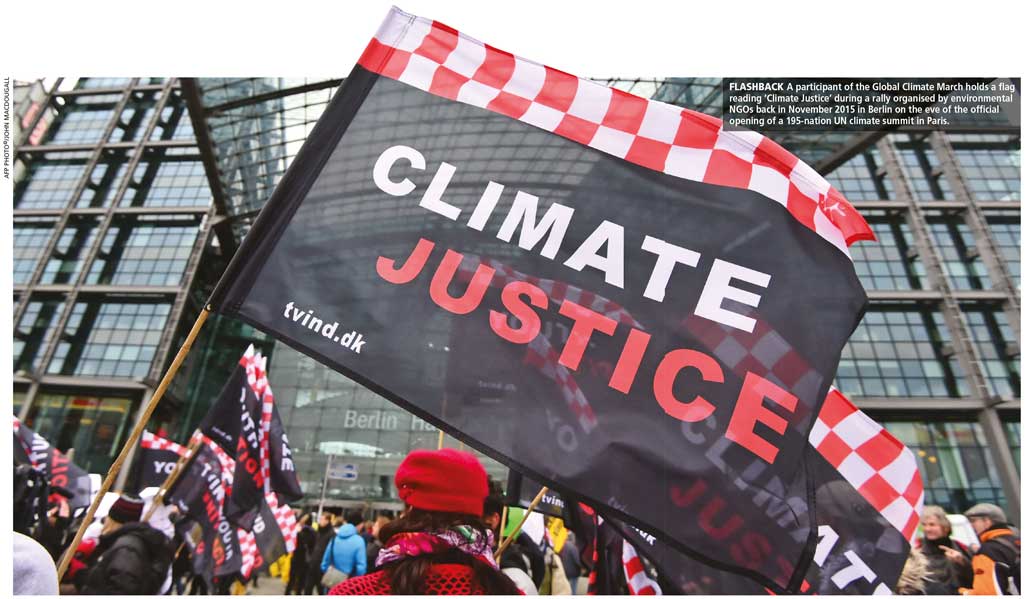CLIMATE CONFERENCE

CODE RED FOR HUMANKIND AT CLIMATE SUMMIT
Saro Thiruppathy discusses what the developing world is demanding from COP26 in relation to the impact of climate change on their countries

The climate report that the Intergovernmental Panel on Climate Change (IPCC) delivered in August was sombre but didn’t contain any surprises. It was a reiteration of the doom and gloom that’s set to befall the planet unless serious action is taken by governments around the world.
Scientists confirm that human activity is slowly but surely destroying the Earth. The report clearly states: “It is unequivocal that human influence has warmed the atmosphere, oceans and land.”
Global surface temperatures have been rising faster since 1970 than in any other half-century period during the past two millennia and the extreme climate patterns crisscrossing the world are a result of this.
The most critical doomsday predictions maintain that temperatures will reach the dreaded mark of 1.5ºC above pre-industrial levels by 2040 under all scenarios vis-à-vis emissions. It’s also envisaged that the Arctic will be ice free at least once before 2050 and there will be an increase in extreme weather and sea level events, as well as fires in several regions.
However, scientists add a glimmer of hope amid these devastating predictions when they say that a catastrophe can be avoided if the world acts quickly. They are hopeful that if global emissions can be halved by 2030 and net zero reached by mid-century, it’s possible to halve and even reverse the rise in temperature.
Net zero is the reduction of greenhouse gas emissions through the use of clean technology, and burial of any releases through carbon capture and storage. Another way is to plant trees that will absorb CO2. Both reforestation and afforestation are recommended since trees are a natural carbon sink.
COP26 CONFERENCE The UK holds the presidency for COP26 in partnership with Italy and the Conference of the Parties is scheduled to be held in Glasgow in November. Alok Sharma is the President of COP26 and will chair the meeting, which 196 countries are expected to attend.
The objective of the United Nations Framework Convention on Climate Change (UNFCCC) is to “stabilise greenhouse gas concentrations in the atmosphere at a level that will prevent dangerous anthropogenic (human induced) interference with the climate system.”
And COP is the decision-making body that’s responsible for reviewing and monitoring its implementation.
Goals listed on the COP26 website include the following: a step change in commitments to emissions reduction, strengthening adaptation to climate change impacts, accessing finance for climate action and enhancing international collaboration.
In an interview with The Observer newspaper in the UK, Sharma says that if urgent action isn’t taken, the consequences will be “catastrophic” and that the IPCC report is “the starkest warning yet that human behaviour is alarmingly accelerating global warming.”
However, he didn’t criticise the UK for allowing more fossil fuel projects such as the new oil field off Shetland and oil and gas wells in the North Sea. There are also plans for a new coal mine in Cumbria.
The disconnect was evident when Sharma told journalists in July that he has been “very clear that I want COP26 to be where we consign coal power to history.”
In the meantime, the International Energy Agency (IEA) has declared that there can’t be any new investment in oil, gas or coal projects if there’s to be a cap on global warming.
COP26 EXPECTATIONS It appears that nations that are responsible for around two-thirds of global emissions haven’t yet laid out clear plans to reach their declared targets and achieve net zero emissions by mid-century.
Meanwhile, the governments of more than 100 developing and least developed countries have demanded action by the rich nations at COP26.
Chair of the Least Developed Countries (LDC) Group at COP26 Sonam Wangdi of Bhutan says: “Despite COVID-19 understandably taking the headlines, climate change has been getting worse over the past year as emissions continue to rise and the lives and livelihoods on the front line suffer.”
Wangdi continues: “We vulnerable countries are not asking for much – just that richer countries who have caused this problem take responsibility by cutting their emissions and keeping their promise to help those their emissions have harmed.”
The LDC Group has submitted five demands – viz. rich countries must bring forward and strengthen their Nationally Determined Contributions (NDC) within this decade; provide the committed US$ 100 billion annually in climate finance to poor countries; help them adapt to the extreme weather that’s impacting their economies; accept responsibility for contributing to the damage and loss to poor countries as a result of climate change; and fully implement the provisions of the Paris Agreement.
Chair of the African Group of Negotiators Tanguy Gahouma-Bekale of Gabon laments: “In 2009 and 2015 they (developed countries) promised to deliver climate finance by 2020. Yet, this is still to be met and we don’t have a clear plan to achieve it.”
Another cause for concern is the decision by the UK to cut overseas aid from 0.7 percent to 0.5 percent of GDP.
If the lofty goals of COP26 are to materialise, honesty must replace hypocrisy at the table and the rich developed nations should honour their pledges. Or else this summit will simply be yet another expensive gathering of talking heads that have needlessly polluted the planet.





Leave a comment